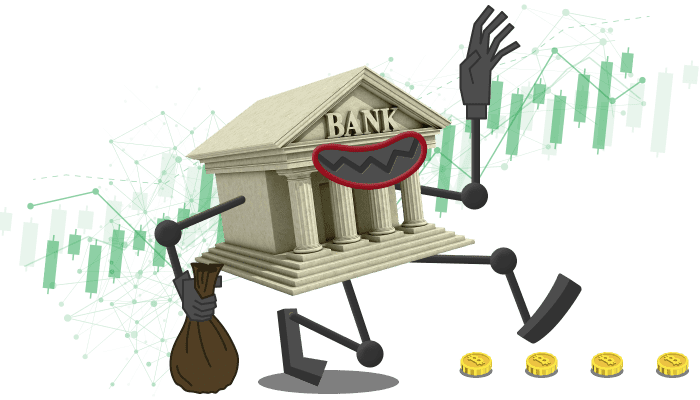Why Do Banks Exist? Do We Still Need Them?
Banks are one of the most polarising topics around.
Like any business, banks exist to make money- and they’re good at it. The fact they do this using our hard earned money is a sore point. Most people view traditional banks as faintly villainous and we’re quick to blame them for economic issues.
Despite this widespread suspicion, let’s face it: living without a bank account is difficult, limiting and potentially dangerous. Banks have evolved to provide the services we need (or think we need.) Our society is structured around the assumption every adult has a bank account.
Banks aren’t evil, nor are they perfect. We need their services because we need money and money needs managing. Like any industry, there are upsides and downsides.
That doesn’t mean banks must remain in their traditional form. Yes, we need a safe way to store and transfer money, save for the future or invest. However, financial services need to evolve to keep up with the current pace of change.
Our grandparents no doubt wanted their banks to be reliable and familiar. The trustworthy local branch with approachable bank tellers.
Flexibility and transparency are now more of a priority. We want to know where our money is and how it’s used. We want, or rather expect, everything to be fast and cheap.
Throughout history, banks have changed as society has changed. With new technologies, regulations, and attitudes, they have adapted. In recent years, they haven’t kept up with the pace of change.
To see why they exist in the first place, let’s take a look at the history of banks.
The History of Banks
It’s hard to establish exactly when the first banks appeared, and they could be older than currency. Texts surviving from about 4000 years ago mention laws governing financial services. That’s a sign banks were already important enough to need regulating.
Services varied in different parts of the world. In 2000 BC, Babylonians could deposit gold at temples for a fee, which was then lent to other people at interest. Temples served as banks in parts of the world for centuries. (Remember the biblical story of Jesus throwing money lenders out of the temple?)
The Romans began to move away from using temples in 352BC, forming the first simple public bank. Roman banks were pretty similar to the ones we use today. They didn’t last. With the collapse of the empire, banks disappeared from Europe until the Middle Ages.
In the 12th century, Jewish people in Italy started offering grain loans. Farmers could borrow grain, they repay it at interested after harvest. Grain loans were the killer app of the day. Profitable and useful, banks soon took off.
The first national bank opened its doors in Venice in 1157.
The first bank failures happened a century later.
Our modern banking system was in place by the 17th century. If you went back in time 300 years, you’d probably find the banks recognizable. They accepted deposits, transferred money, made loans and followed strict government regulations.
The basic structure of banks hasn’t changed much since then. There are new products, different regulations, better technology and so on. But banks still meet the same two main needs:
They give us a safe place to keep our money.
And they let us borrow money and repay it at a later date.
Do we still need banks?
In the wake of the 2009 bailouts, banks have become the target of innovators and disruptors. It’s undeniable that we still need the services banks provide. Unless there’s a fundamental change in human nature, we’ll always need a way to store our money and a way to borrow more. Traditional banks aren’t necessarily are here to stay though.
Until recently, we didn’t have a good alternative to traditional banks. Cryptocurrencies now offer a way to manage our money without centralized control.
Back in the 90s, Bill Gates said we need banking services, not banks. He was right. That’s becoming a reality at last.
That’s why Wirex is releasing an advanced cryptocurrency banking platform. You’ll have access to those vital everyday services- making and receiving deposits, setting up standing orders, a debit card and more – without many of the problems traditional banks pose.
We’ve come along way since the days of moneylenders in temples. With a crypto friendly bank account, you’ll have the best of both worlds. Reliability, plus transparency and flexibility.



Congratulations @chnorris! You have completed some achievement on Steemit and have been rewarded with new badge(s) :
Click on any badge to view your own Board of Honor on SteemitBoard.
For more information about SteemitBoard, click here
If you no longer want to receive notifications, reply to this comment with the word
STOP